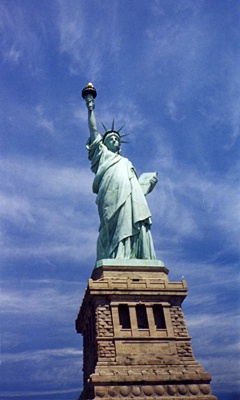All Nonfiction
- Bullying
- Books
- Academic
- Author Interviews
- Celebrity interviews
- College Articles
- College Essays
- Educator of the Year
- Heroes
- Interviews
- Memoir
- Personal Experience
- Sports
- Travel & Culture
All Opinions
- Bullying
- Current Events / Politics
- Discrimination
- Drugs / Alcohol / Smoking
- Entertainment / Celebrities
- Environment
- Love / Relationships
- Movies / Music / TV
- Pop Culture / Trends
- School / College
- Social Issues / Civics
- Spirituality / Religion
- Sports / Hobbies
All Hot Topics
- Bullying
- Community Service
- Environment
- Health
- Letters to the Editor
- Pride & Prejudice
- What Matters
- Back
Summer Guide
- Program Links
- Program Reviews
- Back
College Guide
- College Links
- College Reviews
- College Essays
- College Articles
- Back
Wiping Out Offensive History
“The Civil War wasn't really about slavery — sorry, folks — but about preserving the United States as a country” (Watson). This is a quote from the 2017 article about wiping out offensive history. People are fighting and debating the idea of whether these statues and times of history should be removed in the United States. The Rep. Reginald Bolding argued, “We can't go through our daily lives honoring symbols of hate, symbols of separation and symbols of segregation right now” (AZCentral). According to Boldings statement, that we must not honor the symbols of hate and slavery are correct; however, these monuments do not represent slavery or hate. They need to be remembered and respected for what they truly represent.
The idea and possibility of taking confederate statues down was never a problem before. But why has it become an issue now? Why do people all of a sudden have a problem with history? We have always been ashamed of the past mistakes and misjudgments made but we have never honored slavery. Many Americans assume that the statues honor slavery but do they really? No. Curt Tipton, an adjutant with the Arizona division of the Sons of Confederate Veterans said, “Taking down a statue because somebody is offended is ridiculous. It's part of history” (AZCentral). What happened, happened. There is no way of changing the past, but rather just learning from our mistakes and focusing on the future. Tipton makes a good point; confederate statues are a part of history and just because someone is offended shouldn’t be good enough reason to take something down. Bob Mesenbrink, a writer for the the Denver Post stated, “monuments to Confederate soldiers were not put up to glorify slavery or any lost Confederate cause, but to memorialize great men and fallen soldiers” (DenverPost). The people of the United States need to remember the real meanings and symbolism of the statues and memorials before taking down or destroying them. Learning the meanings, will help educate and teach people to respect and honor statues for their true meanings, rather than what they think they represent.
We are changing history of the past. Taking down monuments will not change what happened. The idea that removing offensive monuments will not make people forget, ignore, or change what happened. Elizabeth Anderson, a writer for the Denver Post said, “Why do Americans feel it’s necessary to change history? It is what it is. If we need to do this then, maybe we need to take down the Washington Monument — George Washington had slaves. Then there is the Jefferson home at Monticello and maybe even the Lincoln memorial. After all, his wife was a Southerner and her family had slaves” (DenverPost). Her article reminds us that everyone through time and history has done something wrong. The monuments and statues that are put up during that time period don’t refer to those bad times, but rather remembering the people who fought and suffered through the tragedies. If we were to take down every statue that had to do with a dark time in the U.S., what would we have left to remember? Nothing. We would be destroying all history. To be able to have good, their will always be bad. The most important thing to remember is the real meanings of those dark times and what we got out of them. The United States stayed united in times of hardships and slavery but by taking down the monuments, is it really worth the risk of possibly dividing the United States? History is history, and the past is the past. It is better to learn from mistakes and understand the real meaning behind statues before destroying something that can't be fixed.

Similar Articles
JOIN THE DISCUSSION
This article has 0 comments.
